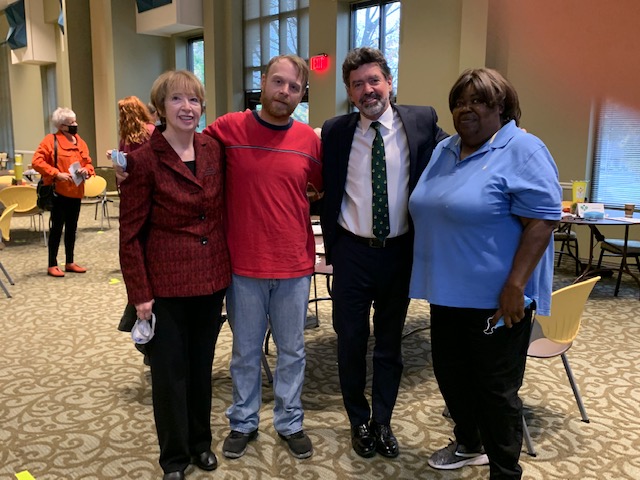Since its inception in 2001, the 21st District Recovery Court has been a blessing for people struggling with substance use disorders. Through the recovery court program, habitual, non-violent offenders are given the opportunity to avoid incarceration, get healthy, and turn their lives around for the better.
The Court has also been a blessing over the years to its founders. One of them, Court of Criminal Appeals Judge Timothy Easter, spoke about the way that the Court had changed him at the Court’s recent annual community breakfast fundraiser. Judge Easter was honored at the event with the Gayle Moyer Harris award. Harris and her husband, former Circuit Court Judge Donald P. Harris, co-founded the Court with Judge Easter. Gayle Moyer Harris also served as the Court’s original coordinator.
In 2001, Judge Easter had been a judge for three years and an assistant district attorney previously. At the community breakfast, he relayed how presiding over the Recovery Court filled him with a sense of renewal, reinvigorating him after years spent in positions that could be emotionally draining.
“Recovery Court has been doing miracles since day one and one of the first miracles was me to be honest with you,” he said. “I had reached a point as a prosecutor and a judge where I was bumping up against something called compassion fatigue.”
As he explained, compassion fatigue can set in after you are confronted with the same types of cases over and over and over again. You can become numb to the human element in these cases.
Recovery Court transformed his perspective. It allowed him to “rediscover something,” which is that the people he saw in his courtroom each day were not just defendants or inmates but children of God “who just like me deserve some grace and some redemption.”
“That was a miracle for this old judge to be able to see these participants and the talents and the abilities that they had because they are made in the image of God just like me and to be able to offer them…a redemptive tool that ultimately would lead to recovery,” Judge Easter said.
Two former Recovery Court graduates who participated in the program under Judge Easter spoke at the event. One of them, Beverly, said that she started using drugs as a teenager. She became dependent on them and was eventually arrested, facing a serious sentence.
“That’s when people were telling me about drug court,” she said. “I was like, ‘I don’t know if I want to do this or not, two years of people telling me what to do.’ But I did. Thank God I did. It really saved my life. It really and truly did because if I didn’t I would be dead now or still in prison somewhere.”
Another graduate, Anthony, completed the program in 2006. He said his decision to speak at the community breakfast was a “no-brainer” after he was told the event would honor Judge Easter.
Anthony took his first drink at the age of 15, and it was downhill from there. He started getting into trouble, and as he got older the trouble escalated. He admits that he agreed to enter the Recovery Court program simply “as a way out because I didn’t want to go to jail.”
Soon, though, Anthony began to believe that God had led him there for a reason. The people around Recovery Court became like a family to him, and he began to discover new ways to improve his life.
“Everyone here that supports Recovery Court are family whether you know it or not,” he told the socially distanced crowd.
Judge Easter was introduced at the event by 21st Judicial District Circuit Court Judge James Martin III, who is the current presiding judge of the Recovery Court. Judge Martin served alongside Judge Easter in the 21st Judicial District from 2008 to 2014.
“I had the opportunity to observe Judge Easter as he served the Recovery Court in addition to serving as a circuit judge and I saw the passion and the dedication he brought to the Court,” Judge Martin said. “It had a great impact on me.”
During this time, Judge Martin would occasionally preside over the Recovery Court when Judge Easter was unavailable. When he did, he realized just how huge Judge Easter’s influence had been.
“When I would cover for him I would realize that presiding over the Recovery Court was much more than just a ceremonial function,” Judge Martin said. “He made a difference in the lives of the people who came before him…He set the standard for the Recovery Court in the 21st district and many other districts throughout the State of Tennessee, and he was a role model for me.”
Judge Easter said he was honored to receive an award named after Gayle Moyer Harris. He spoke about what she and Judge Harris mean to him.
“They are remarkable people and really treasures of this community,” he said. “Gayle has the compassion of a thousand angels. Everything she touches, she touches with compassion. The fact that I’m getting an award with her name on it is something I will treasure forever.”
Since the Recovery Court’s creation in 2001, it has had 350 participants, 165 of whom completed the two-year, intensive program. Around 60 to 70 percent of graduates do not re-enter the justice system.
A number of other judges and local officials were on hand at the community breakfast to support the Recovery Court and honor Judge Easter.
They included the following:
Court of Criminal Appeals Judge Robert L. Holloway, Jr.
21st Judicial District Circuit Court Judge Michael W. Binkley
21st Judicial District Circuit Court Judge Deanna Bell Johnson
Senior Judge Robert E. Lee Davies
Williamson County General Sessions Court Judge Denise Andre
Williamson County General Sessions Court Judge Tom Taylor
Tennessee State Senator Jack Johnson

